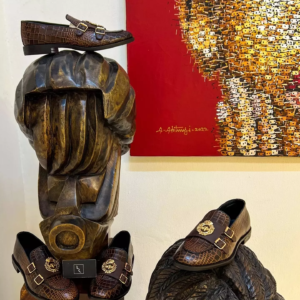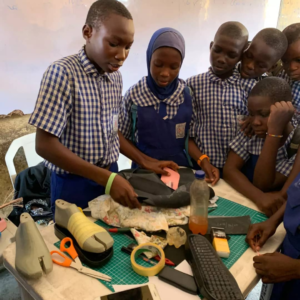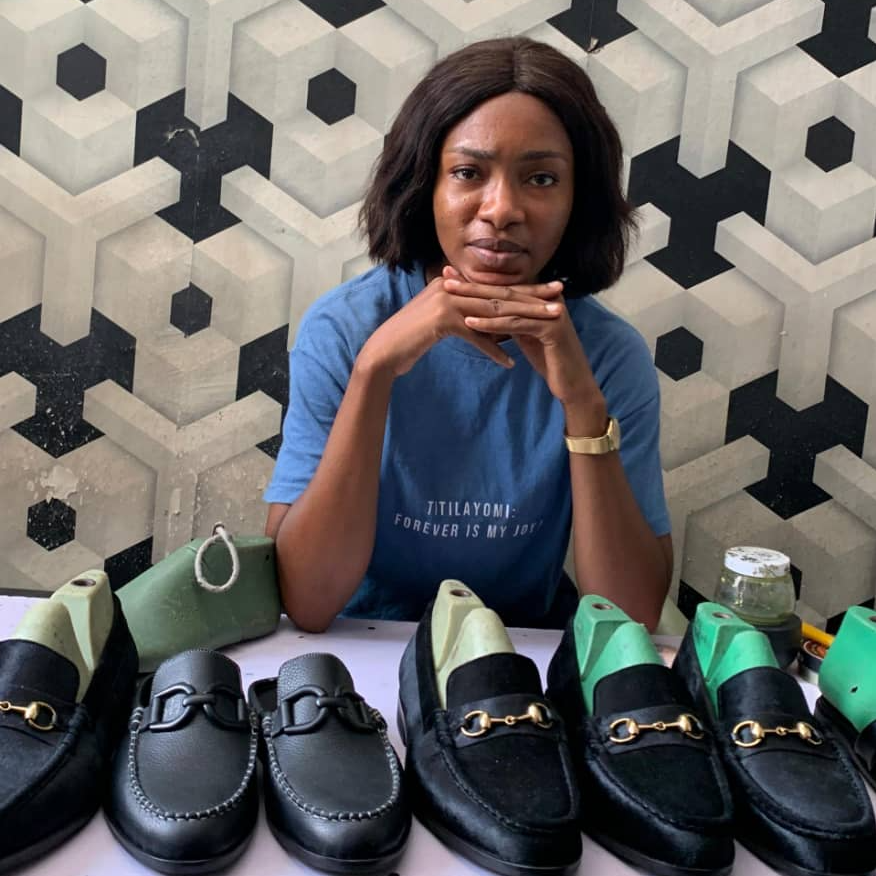Having lost her dad at 13, Titilayo Bisiriyu felt a dramatic shift in her world. The responsibility of caring for the family promptly fell on her mother, a local trader, which resulted in Titilayo completing her secondary-school education in a Lagos public school. During her gap year, she sought employment to support herself, a common path for many who, unfortunately, never return to further their education.
The second of four children, Titilayo taught in a secondary school to make ends meet. Despite this, she couldn’t pay to have her shoes mended one awful morning; instead, she cobbled them using a nail. But this caused an unease in her gait as she walked to the assembly ground.
“On getting to the assembly ground, the principal asked me to address the students,” Titilayo recalled. “I was trying to address the students when one of the students saw my shoe and noticed that it was not balanced. He immediately started laughing.” Although Titilayo felt humiliated, this experience sparked her passion for shoemaking.
Years later, during her industrial training (IT), Titilayo worked as a journalist for a nautical media company while pursuing a degree in mass communications. She experimented with selling ready-made Italian shoes and bags around this time. However, her sales dwindled when a friend introduced her to cheaper Nigerian-made shoes of inferior quality.
This decline in sales prompted the rising entrepreneur to reevaluate her business strategy. As she discovered, her customers, accustomed to ready-made Italian shoes, were hesitant to embrace locally crafted footwear.
It was during this period of reflection that she stumbled upon the story of Tilahun Bethlehem, an Ethiopian shoemaker noted for making high-quality footwear from discarded materials such as car tyres. Bethlehem’s ingenious approach to shoemaking struck a chord with Titilayo, who began to approach her craft from a new perspective. “So I came up with the idea of having to make use of our natural resources to produce what would help resolve health issues globally,” Titilayo said.
As she questioned established practices in the shoemaking industry, she worked assiduously on making her mark. Additionally, she drew on the creativity of successful shoemakers like Daina, who made shoes from a traditional fabric known as Adire. To resolve the strain that comes with walking for too long, Titilayo fitted her shoes with insoles. “For every shoe, I make sure they are soft because my statement is comfy.”
As her passion for shoemaking grew, Titilayo made a life-changing decision: she resigned from her stable job in accounting to fully commit to her craft. The decision was risky, but her drive to create something unique outweighed her fears. She was inspired by the stories of people like Bethlehem, who had not only mastered their craft but also empowered others in the process.

However, her journey was far from smooth. She faced financial setbacks, including being scammed out of N35,000 by someone who promised to help her acquire materials. Despite the disappointment, Titilayo persevered, keeping the incident to herself to avoid worrying her family. Travelling long distances daily to learn shoemaking in Lagos, she encountered numerous challenges, including doubts from those around her and the ridicule of being called a “shoemaker.”
Determined to succeed, Titilayo began marketing her products in local markets and taking photos of her shoes at picturesque sites, often evading security to avoid fees she couldn’t afford. These struggles only strengthened her resolve, leading to the creation of her brand, L’riyu. Despite early setbacks, including having to remake shoes and find new customers for rejected products, Titilayo remained committed to her vision.
Her mother played a crucial role in supporting her during tough times, handling customer complaints and helping smooth over challenging situations. Together, they navigated the difficulties of building trust with clients and proving that her business was legitimate.
Titilayo’s dedication to her craft was further recognised when she was commissioned by a foreign client to create a Goodyear welted shoe, a highly complex and high-quality type of footwear. “It took me one month to complete the project,” she said, adding that she believes she is the first woman in Nigeria to successfully produce such a shoe.
The Initiative, L’riyu Shoes Academy
Beyond her shoemaking business, Titilayo is passionate about giving back to her community. In 2023, she launched the L’riyu Shoe Academy, offering free training to aspiring shoemakers. The academy started at her alma mater and has since gained approval from the Lagos State Government to expand its reach. The most recent training session at Festac College saw 1,000 students trained and provided with essential tools.

Titilayo’s journey has not been without challenges, including having to leave her initial shoemaking trainer due to his inappropriate advances. However, she remains undeterred, stating, “Shoemaking is in me, and I am shoemaking.
Her achievements have not gone unnoticed. In 2023, she was awarded Young Female Entrepreneur of the Year by the Lagos Entrepreneurial Award (LEA) and recognized as one of the Top 100 SDG Advocates by YouthNow in 2024. She is also a certified Young Women Leader through Leap Africa.
Looking to the future, Titilayo envisions L’riyu shoes gaining global recognition and contributing to Nigeria’s reputation for high-quality, health-conscious footwear. Her advice to others is simple yet powerful: “The world is too small not to be conquered.”
Titilayo Bisiriyu's life changed dramatically at age 13 when she lost her father, leading her mother to support the family through local trading. Despite financial hardships, Titilayo completed secondary school and briefly worked as a teacher. A humiliating moment with her patched shoes sparked her interest in shoemaking. While studying mass communications, she sold Italian shoes, but declining sales of inferior Nigerian footwear inspired her to create high-quality, health-conscious shoes using natural resources.
Facing setbacks and skepticism, Titilayo established her brand, L’riyu, and committed fully to her craft, ultimately achieving recognition for her innovative designs. She founded the L’riyu Shoe Academy in 2023 to provide free shoemaking training, receiving support from the Lagos State Government. Despite challenges, including financial losses and inappropriate advances from a trainer, Titilayo's determination fueled her success. She was honored as the Young Female Entrepreneur of the Year in 2023 and aims for global recognition of her brand.






